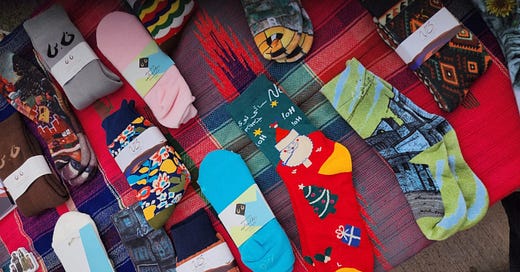Socking it to the Market
After a strong start in Kurdistan, Namosocks is eyeing expansion abroad
When Namo Hassan registered his business in the Kurdistan Region of Iraq, his application raised eyebrows. “They said you’re only selling socks; why do you need a business?” he says. Two and a half years later, the success of Namosocks is a testament to the passion and persistence he has channeled into building his company. Profits have doubled over the past two years, and a growing roster of local and international clients is opening up expansion opportunities, with plans to sell on Amazon and eBay and establish points of sale abroad.
Looking back now, he’s glad he overcame the barriers to formalize his business, even if it did take more than eighteen months to secure a license. “It was partly because I was the first company to specialize in socks,” the 27-year-old says.
Even if you aren’t breaking new ground, registering a new business in Kurdistan is a lugubrious process that risks alienating young business owners. Funds must be set aside for legal and accountancy costs, registration fees, insurance, and office space—money that startups can ill afford to spend. It's also time-consuming, often taking more than a year before approval comes through. As a result, many small startups operate unofficially to bypass the registration process, which makes it harder for them to grow and contribute to the emerging business economy.
At a time when Kurdistan is looking to diversify its economy away from oil revenues and promote private sector growth, supporting the start-up sector is a priority, but the environment remains challenging for aspiring entrepreneurs. “Kurdistan has the potential to join Dubai and Saudi Arabia at the center of the free enterprise movement in the Middle East,” says Faisal Al Mutar, President of Ideas Beyond Borders. “There’s no shortage of talent, but at present, there is a lack of infrastructure to support enterprising people with bold ideas.”
As a teenager, Hassan indulged his penchant for colorful socks, even when friends laughed and mocked his fashion choice. If anything, it motivated him to wear more outlandish designs. “It was unusual and different, and people here don’t live for themselves; they live for the opinions of others. I didn’t approve of that.” The only trouble, he says, was finding colorful socks in a market dominated by drab designs and poor-quality products.
Which is why, in 2021, Hassan decided to fill the gap in the market and launch a company that would specialize in high-quality socks featuring beautiful, vivid designs. These socks are made from smart wool, which matches the temperature of the feet to prevent sweating, and are sold in a range of sizes to ensure the correct fit. This means there is no irritating slippage, and the product lasts longer, he explains, pointing to high rates of customer satisfaction and 100 percent positive feedback from Namosocks clients.
Among them is his father, whose approval was an early indication that Namosocks would work. In his teenage years, they disagreed over Hassan’s sock choices. “Whenever we went out to visit relatives, he was like security waiting outside my room, double checking I was wearing regular socks,” Hassan recalls. Now, he is an enthusiastic supporter of his son’s company, which offers different designs for different audiences, including plain, color, and whimsical culture socks with illustrations by local artists.
Starting Namosocks was a steep learning curve, and Hassan worked hard to learn the skills needed to make his business a success. Now, he is helping other entrepreneurs in the early stages of developing their ideas. “I encourage them to focus on quality over profit—that will come later,” he says.
A new project launched last year by Ideas Beyond Borders is working to improve the landscape for startups in Kurdistan and foster the emerging small business scene. The Kurdistan is Open for Business project aims to simplify the registration process while campaigning for pro-business legal reform, working with local NGOs and the Kurdish parliament to ease bureaucratic barriers for new businesses and amend outdated legislation.
It will also provide grants and technical assistance to dozens of new business owners and launch a one-million-view social media campaign to bolster Kurdistan’s credentials as a destination for new business. “The new generation are looking for new ways to solve the challenges they face. More and more young people we meet are taking matters into their own hands with ideas that will bolster growth, create employment, and modernize sectors that are stuck in the past,” says Al Mutar.
Progress has already been made with a new government portal allowing businesses to register online, but challenges remain. As the system plays catch up, entrepreneurs advise one another on navigating Kurdistan’s small business scene. “It’s a supportive network. There are a lot of young people starting businesses,” Hassan says.
The biggest hurdle has been money. Until he received an Innovation Hub grant from Ideas Beyond Borders, funding opportunities felt out of reach. “It’s really tough for a young person with no connection or business background. You have a society that is not helping much, a process that’s not helping much, and a government that’s not helping much—the odds are against you,” Hassan says.
But it has been worth the hard work to establish his business, which has sold over 3,500 pairs of its socks, retailing at $12 a pair. Buoyed by their success so far, Hassan is now saving to expand the brand’s presence abroad while exploring ways to develop their offering with plans for a children’s line in the future. “It’s amazing. I have started my business two and a half years ago, and my passion keeps growing and growing. I never get bored of talking about socks.” he says.
This article was written by Olivia Cuthbert.





